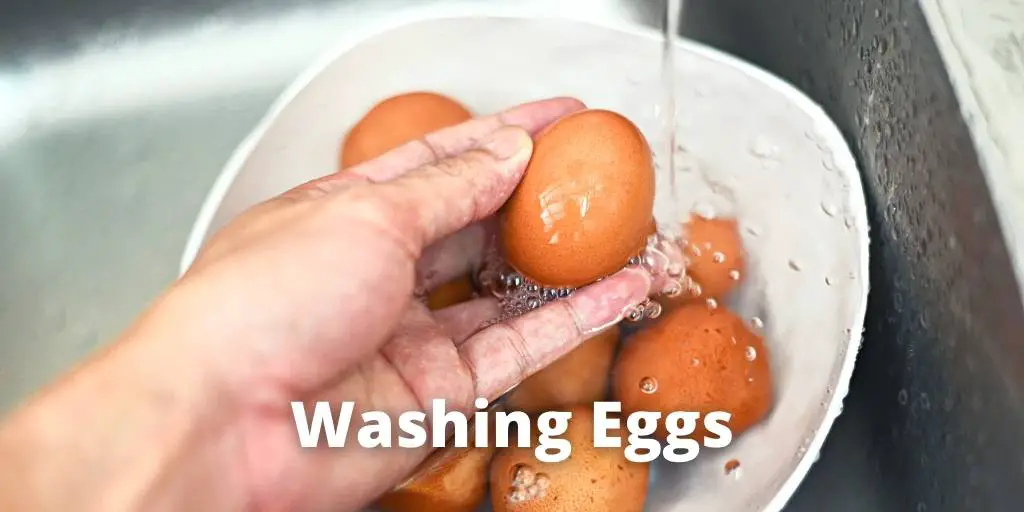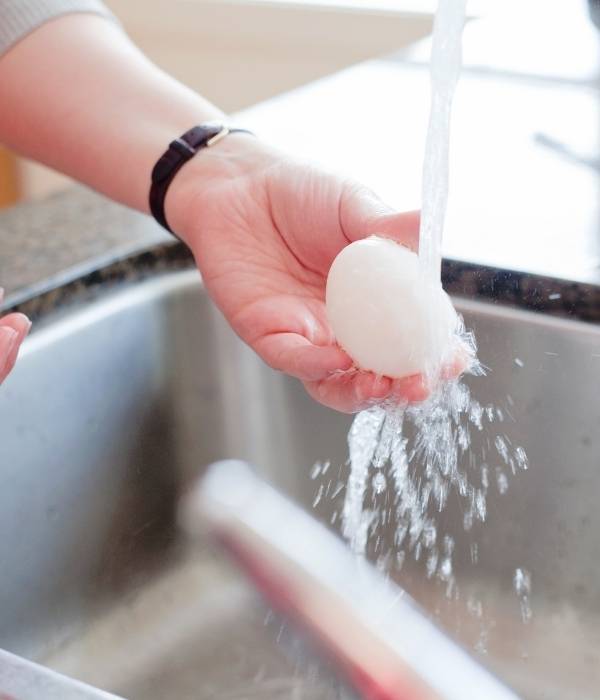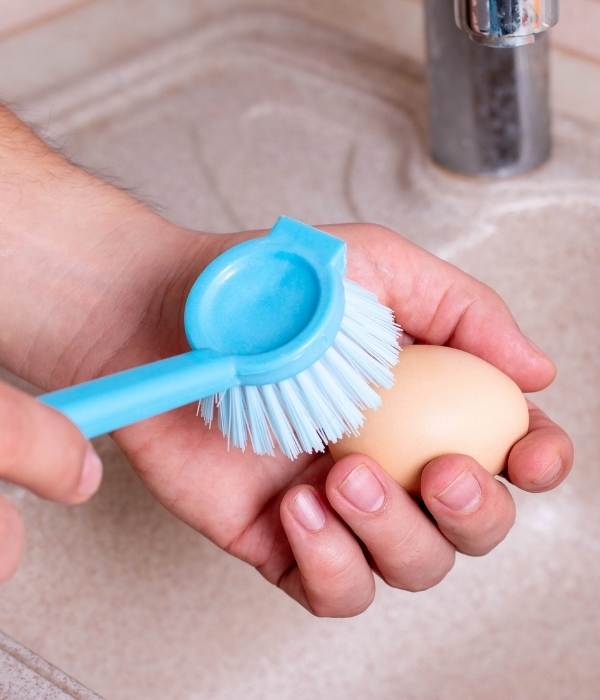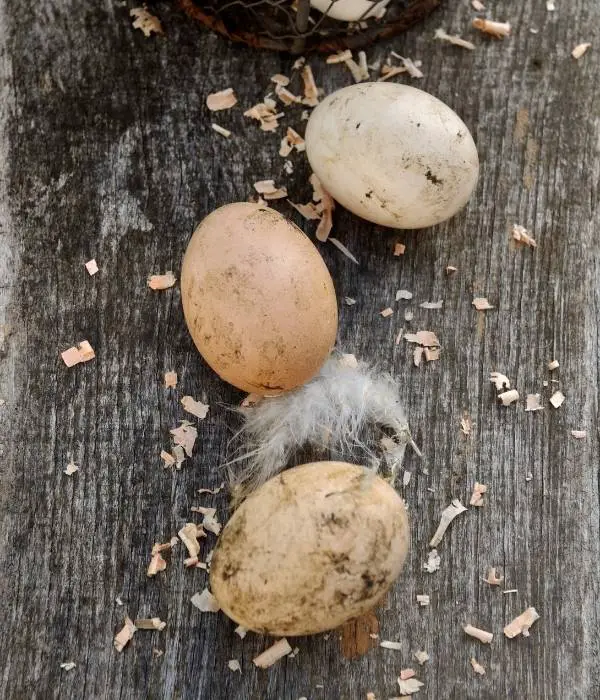
In this article, we will talk all about washing eggs. Do we need to clean eggs? If so, then why and how? If not, then why?
Also, we will discuss the difference between store-bought and fresh farm chicken eggs. After reading this guide, you will know how to wash eggs.
Also read: Top 10 Best Egg Skelter
Store Bought Eggs vs. Farm Fresh Chicken Eggs
- 365 by Whole Foods Market products give you that...
- The best tasting eggs are important. All eggs in our...
- The hens are fed a diet without animal by-products or...
Last update on 2024-07-12 / Affiliate links / Images from Amazon Product Advertising API
The Shelf Life of an Egg
Fresh farm eggs are age-specific because you know when you collected them. Before buying eggs, you don’t know how old or long they’ve been on the shelf.
Eggs may sit on the store shelf for 30 days before being purchased. In some areas, transferring eggs from the facility where they were laid to the supermarket can take weeks.
Store-bought eggs may be more than a month old, unlike farm-fresh eggs. Farm eggs are fresher and better than supermarket eggs.
Farm-fresh eggs have “bloom.” If you don’t wash the eggs, the bloom’s cell-protective membrane will keep them longer than store-bought eggs.
Unless you wash farm-fresh eggs, they don’t need refrigeration.
Even without washing, farm-fresh eggs can be kept on the countertop at room temperature until use, unlike store-bought eggs.
- DURABLE: Constructed of high quality food-grade chrome...
- FUNCTIONALITY: Perfect for collecting and rinsing...
- STABLE: Securely welded at every joint
- SPECIAL OCCASION: Easy and fun to carry around for egg...
- SPECIFICATIONS: 7.3 inches L x 10 inches W x 9.3 inches...
Last update on 2024-07-12 / Affiliate links / Images from Amazon Product Advertising API
Nutritional Value of the Egg
Both store-bought and farm-fresh eggs are healthy. The two eggs have different nutritional values.
Farm-fresh eggs have less cholesterol, saturated fat, and vitamins A, E, and D than store-bought eggs.
The farm-fresh eggs have more beta-carotene and omega-3s than store-bought.
Farm-fresh eggs have more Omega-3 fatty acids because the birds eat bugs, leafy greens, corn, and flowers.
Most caged hens that lay store-bought eggs lack these nutrients. Farm-fresh eggs contain omega-3, which aids in daily functioning and prevents chronic disorders.
Farm-fresh eggs have higher Vitamin E, which reduces inflammation and provides antioxidants.
Vitamin D insufficiency harms modern civilization. Farm eggs provide more vitamin D than store-bought eggs because the chickens forage for nutrition from nature.
Farm-fresh eggs have less cholesterol than both. High cholesterol is unhealthy.
However, moderate doses like those from farm-fresh eggs will assist in regulating blood calcium and phosphorus levels.
Flavor of the Egg

Fresh eggs from farms taste different from store-bought eggs. People who haven’t noticed the difference say they taste the same, but farm-fresh eggs have a special, awesome taste.
When you sample both and pay attention, you’ll notice a difference in flavor between store-bought and farm-fresh eggs.
Store eggs are larger than farm eggs. Store-bought egg yolks are easier to crack than farm-fresh ones.
Farm-fresh eggs taste richer. Farm-fresh eggs have deeper yolks that seem richer and healthier than store-bought eggs.
- Brought to you by Whole Foods Market
- Eggs from hens fed vegetarian feed that meets non-gmo...
- Raised naturally without antibiotics vegetarian feed...
- Cage-free plus birds live indoors with perches and...
Last update on 2024-07-12 / Affiliate links / Images from Amazon Product Advertising API
Appearance of the Egg
Probably the most obvious difference between store-bought and farm-fresh eggs. Just how different they seem is almost worrying.
Store-bought egg yolks are fluorescent yellow, but fresh egg yolks are darker and nearly golden. I love receiving a dozen multicolored eggs from my backyard chickens.
Eggs bought in the store are unlikely to be rainbow-colored. Egg color and size depend on the chicken breed.
Fresh farm eggs are appealing, but their yolks speak it all. The fresh farm yolks are dark yellow or orange, reflecting their richness and nutrition.
Treatment and Safety
Many people today are greedy. Most animals, especially hens, suffer from greed.
Most large-scale producers solely worry about egg production. Thus, they will do anything to maximize livestock profits.
Chickens lay store eggs in tight cages that cannot move. You may get salmonella from store-bought eggs.
Caged hens that lay most store-bought eggs may catch salmonella, which can spread to the eggs.
Most caged hens who lay store-bought eggs are depressed, unlike backyard chickens that roam and eat what they want, producing nutritious eggs.
You buy the proper eggs if you see chickens pecking at the ground as you walk up that farmer’s driveway. While working in the yard, these chickens can eat bugs for protein and greens.
Most supermarket eggs come from birds that have lived in different environments. These birds sit in their droppings, eating pellets in tiny cages.
This prevents them from being chickens. This makes them less healthy and less active than free-range chickens.
Also read: Mealworms for chickens
Washing Eggs Which Are Collected From Backyard Farm

Washing eggs must be done with 90°F water.
The contents of eggs expand when washed in warm water at the correct temperature.
Washing eggs is unhealthy and not advised.
This is because washing eggs may help dangerous bacteria enter the egg.
Washing eggs removes bloom. Bloom, an egg’s cell membrane, protects and extends its survival.
But you can wash eggs. The water to wash the eggs should be 11°C higher than the egg’s temperature and dry faster.
If not, leave eggs unwashed. Some salmonella strains are deadly.
Washing eggs weakens the eggshell’s natural barriers, allowing salmonella to enter.
If the egg is undercooked, salmonella can cause illness.
Do I Need to Clean Freshly Laid Eggs?
If fresh eggs surface is dirty or patches of poop, clean them. Eggs with chicken poop may need cleaning.
You’ll need the conditions to keep dirt and pollutants out of fresh eggs’ shell pores.
Should eggs be cleaned? You need not clean them. Fresh eggs have a cuticle or bloom.
This natural layer will keep air and bacteria out of eggs, protecting them first.
If you clean fresh eggs, you remove their natural barrier, making them vulnerable to harmful bacteria and microorganisms, especially if not properly cooked.
Do I Need to Wash Store-Bought Eggs?
Store-bought eggs don’t need cleaning. According to USDA rules, grocery store eggs are washed and pasteurized.
Pasteurization destroys microorganisms by heating eggs. Commercial eggs are sanitized using spray.
Store-bought eggs must be refrigerated since they lack a bloom to prevent pathogens from entering.
How Do You Clean Fresh Eggs Without Removing Bloom?
- SUBSTANTIAL SNACKING: We boil up ethical eggs, pre-peel...
- MADE WITH FRESH AIR & SUNSHINE: Our Vital Farms...
- FROM SMALL FAMILY FARMS: We began as a single-family...
- CONSCIOUS CAPITALISM: Vital Farms is a Certified B...
- ON THE GO: These pasture-raised eggs are packed into a...
Last update on 2024-07-12 / Affiliate links / Images from Amazon Product Advertising API
Washing Eggs With Water
Warm water is needed to clean fresh eggs. If chicken droppings have contaminated fresh eggs, they may need cleaning.
Rinse eggs in warm water. To clean dirt and bacteria from the eggshell, use warm tap water. Cold water might spread bacteria.
Do not use bleach, soap, or detergent. Porous eggshells let chemicals into the eggs.
After that, thoroughly dry the eggs with paper towels and refrigerate them. You’ll need an enclosed container to store eggs in the fridge to avoid breakage.
Refrigerating eggs reduces salmonella, which can cause food poisoning. Mineral oil sprays help prevent eggs from drying out in the fridge.
Washing Eggs Without Water
Fresh eggs contaminated with chicken droppings can be cleaned without water. A sponge will help you eliminate chicken droppings and other filth.
How to Wash Store-Bought Eggs?
You don’t need to wash store-bought eggs since pasteurization kills bacteria. Warm running water is recommended for washing them.
It is recommended to wash eggs in warm water without detergent or bleach. After drying with a paper towel, place the eggs in an enclosed container.
To preserve moisture, spray eggs with mineral oil and refrigerate.
Other FAQs on Washing Eggs

How to Properly Clean Fresh Eggs?
You can clean fresh chicken eggs if they have chicken droppings. This will help in getting rid of the droppings and dirt.
You can use warm running water to rinse the fresh chicken eggs.
Dry the eggs with a paper towel after rinsing with warm running water. Then, you put the eggs in an enclosed container and keep them refrigerated.
You can also use a slightly abrasive sponge to wipe dry and clean the fresh chicken eggs.
Do You Need an Egg Cleaner for Fresh Eggs?
You do not need an egg cleaner for fresh eggs. Most fresh eggs from farms are always clean.
They do not need to be cleaned unless they have chicken droppings; in this case, you can use an abrasive item like a sponge to wipe dry.
Why Are Store-Bought Eggs White?
The store-bought eggs may be worthwhile because of the breed of the chicken that laid them.
The pasteurization process in the eggs may also affect their color, but it will not have much effect since the heat-up process only kills bacteria.
What About Cleaning Eggs With Vinegar?
You can also use vinegar to clean eggs. The vinegar solution’s acidic nature will help remove dirt, grime, poop stains, and even blood from farm-fresh eggs.
Vinegar’s strong nature will quickly break down the poop, dirt, and other elements without interfering with the bloom unless you scrub the egg aggressively.
How to Clean Chicken Poop off Dirty Eggs?
You can use multiple ways to clean chicken poop off dirty eggs. If it is dry, you can use warm running water or vinegar to get rid of the poop. However, if the poop is still wet, you can use a dry sponge.
Conclusion
Farm-fresh eggs are healthier than store-bought ones. There are many health benefits to eating fresh farm eggs.
Washing eggs removes the bloom, leaving the inside open to germs and other organisms like salmonella that can affect your health.
With this thorough information, you can readily distinguish farm-fresh eggs from store-bought ones. This washing eggs guide should improve your backyard farming.






Leave a Reply